
Significance of Women’s History Month in Today’s Society
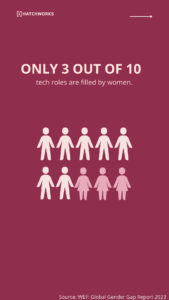
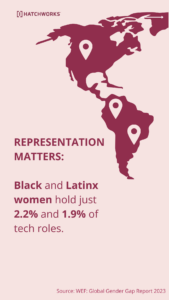 This month is pivotal for promoting gender equality in STEM, illuminating female achievements to inspire future generations.
This month is pivotal for promoting gender equality in STEM, illuminating female achievements to inspire future generations.
Despite progress, women fill only 3 out of 10 tech roles and Black and Latinx women hold just 2.2% and 1.9% of tech roles. This underscores the ongoing gender gap and the need for diversity in the tech industry.
Celebrating this month encourages young girls to pursue careers in fields like AI and ML, where women’s representation is growing but still needs support. That’s why this year, we spotlight the profound impact women have made in the realms of artificial intelligence (AI) and machine learning (ML), areas where their innovation and leadership continue to shape the future of technology.
Trailblazing Women
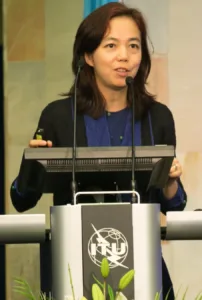
Dr. Fei-Fei Li
A titan in artificial intelligence, Dr. Fei-Fei Li has carved a path through the AI landscape with her groundbreaking work on human-centered AI technologies. From her humble beginnings as an immigrant with a dream, she has risen to become a leading voice in AI, holding the prestigious position of the inaugural Sequoia Professor in Stanford University’s Computer Science Department.
Pioneering AI and Promoting Inclusive Technology
Founding ImageNet and Advancing Computer Vision
Li is the inventor of ImageNet, a pivotal dataset that has significantly contributed to the advancements in deep learning and computer vision. ImageNet and its associated challenge have revolutionized large-scale visual recognition, setting a new benchmark for AI research.
Advocacy for Diversity and Inclusion in AI
Through her non-profit work with AI4ALL, Li has been instrumental in promoting diversity and inclusion within the AI field.
AI4ALL aims to educate the next generation of AI technologists, thinkers, and leaders by emphasizing human-centered AI principles.
The initiative has expanded to include several summer programs across universities, demonstrating her commitment to creating a more inclusive AI community.
Leadership and Recognition
Beyond national recognition for her technical contributions, Li has been acknowledged for her leadership and impact on the field.
She has received numerous awards and recognitions, including election to the American Academy of Arts and Sciences and the National Academy of Engineering.
Her role on various boards and advisory committees underscores her influence and dedication to ethical AI development.
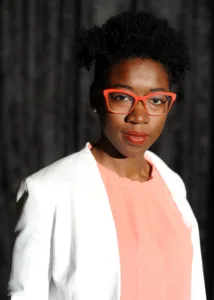
Dr. Joy Buolamwini
Dr. Joy Buolamwini’s work sits at the crucial intersection of social justice and technology, challenging and addressing biases within artificial intelligence.
As a Ghanaian-American computer scientist, digital activist, and “poet of code,” she founded the Algorithmic Justice League (AJL) to combat bias in AI.
Advancing AI Ethics and Algorithmic Equality
Addressing AI Bias through Research and Advocacy
Buolamwini’s research has exposed significant racial and gender biases in AI services offered by major companies like Microsoft, IBM, and Amazon.
Her work prompted these companies to reconsider their facial recognition technology’s deployment, especially regarding law enforcement applications.
Public Engagement and Policy Influence
By leveraging her platform, Buolamwini has advised elected officials during US congressional hearings and served on global panels to guide world leaders and technology executives in mitigating AI’s harmful effects.
Her efforts underline the importance of inclusive and responsible AI development.
Recognition and Influence
Buolamwini’s contributions have not gone unnoticed. She has been acknowledged as a leading voice in AI ethics, earning spots on prestigious lists like Bloomberg 50, Forbes 30 under 30, and Time 100 Next.
Her work has been featured in major publications and she has received numerous accolades for her efforts to democratize technology.
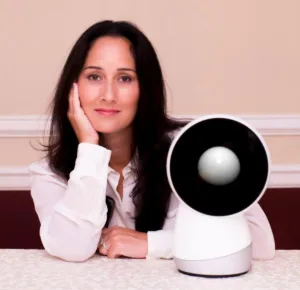
Dr. Cynthia Breazeal
An innovator in robotics, Dr. Cynthia Breazeal is known for her pioneering work in social robotics and human-robot interaction.
As a professor at MIT and founder of the Personal Robots Group at the MIT Media Lab, her research focuses on developing robots that can engage with humans in socially meaningful ways.
Innovating Human-Centric Robotics and Social
Interaction
Innovations in Social Robotics
Breazeal’s development of robots such as Leonardo and Kismet, which were among the first to exhibit social cognition and interaction capabilities with humans, highlights her contributions to making robots more relatable and effective partners in human activities.
Her work in this area aims to improve human-robot teaming through social learning abilities such as imitation and tutelage.
Educational and Therapeutic Applications
Through the Personal Robots Group, Breazeal has explored the application of social robots in education, health, and wellness.
Projects like Autom, a robot diet and exercise coach, and Huggable, a pediatric companion, underscore her commitment to leveraging robotics to support personal goals and enhance the quality of life in various domains.
Leadership and Recognition
Breazeal’s influence extends beyond academia into the realms of entrepreneurship and advisory roles.
Her co-founding of Jibo, Inc., a consumer social robotics company, and her participation in advisory boards for media and science organizations reflect her status as a thought leader in AI and robotics.
Her recognition includes awards from the National Academy of Engineering, Technology Review, and Time magazine, among others.

Dr. Daniela Rus
Dr. Daniela Rus, Professor of Electrical Engineering and Computer Science at MIT, stands at the forefront of robotics, AI, and computational design.
As the Director of the MIT Computer Science and Artificial Intelligence Laboratory (CSAIL), her work spans creating autonomous systems that enhance human life in transportation, healthcare, and everyday tasks.
Rus’s leadership in collaborative and distributed robotics research explores the boundaries of machine autonomy and collaboration, contributing significantly to the field’s evolution.
Transforming Robotics with AI and Collaborative Systems
Innovations in Robotics and AI
Rus’s contributions to robotics and AI are vast, with her interests lying in how machines can collaborate to achieve common goals.
She leads initiatives that explore the potential of networked, distributed, and collaborative robotics, asking pivotal questions about machine collaboration and autonomy.
Her projects have included creating feedback systems for smoother human-robot interaction, developing drones controlled by brain signals, and aiding the physically disabled through technology.
Contributions to Computational Design and Fabrication
Rus has been instrumental in pioneering 3D printing techniques for creating robots and functional objects with embedded electronics and tunable mechanical properties.
These advancements not only showcase the integration of AI into physical forms but also open up possibilities for assistive devices that enhance human capabilities.
Recognition and Leadership
Rus’s expertise has been recognized globally, with her inclusion in prestigious lists such as Forbes’ “Incredible Women Advancing A.I. Research.”
She is a member of the National Academy of Engineering and the American Academy of Arts and Sciences, among other honors.
Her leadership extends to serving on the White House’s President’s Council of Advisors on Science and Technology (PCAST), where she provides valuable insights on the intersection of AI with societal and policy issues.
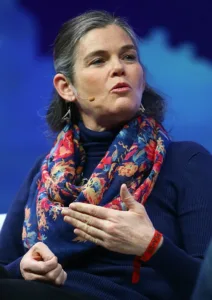
Dr. Daphne Koller
Dr. Daphne Koller, a visionary in artificial intelligence and machine learning, has significantly influenced online education and biomedical AI.
With a Ph.D. in Computer Science from Stanford University, Koller co-founded Coursera, democratizing access to quality education globally.
Shaping the Future of Online Learning and Biomedical AI
Innovative Research in Artificial Intelligence
Koller’s work has substantially advanced the understanding and application of AI, particularly in probabilistic graphical models and Bayesian networks.
Her efforts in developing computational methods for decision-making in complex systems under uncertainty have bridged gaps between logic, probability, and judgment, significantly impacting AI’s role in various disciplines.
Pioneering Online Education
As a co-founder of Coursera in 2012, Koller has been pivotal in creating and scaling an online platform that brings top-quality courses to learners worldwide, thereby fostering an inclusive environment for education.
Her vision for Coursera was instrumental in its growth to become one of the leading online learning platforms.
Leadership and Recognition
Koller’s leadership roles extend into her position as the director of Insitro, where she continues to push the boundaries of applying AI in life sciences.
Her numerous accolades, including induction into the National Academy of Engineering and the American Academy of Arts and Sciences, underscore her impact on technology and society.
Time magazine’s acknowledgment of her as one of the 100 Most Influential People in 2013 highlights her widespread influence.
How to Get Involved in Women’s History Month and Support Women in AI/ML
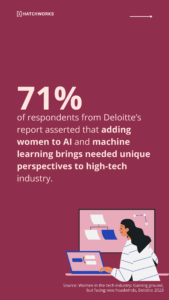
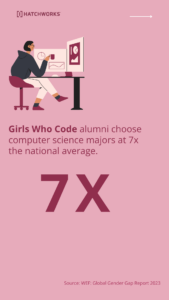 Supporting women in AI/ML can involve attending seminars, advocating for inclusive hiring practices, and mentoring. For example, Deloitte’s report (2020), suggests that 71% believe adding women to AI brings unique perspectives essential for innovation.
Supporting women in AI/ML can involve attending seminars, advocating for inclusive hiring practices, and mentoring. For example, Deloitte’s report (2020), suggests that 71% believe adding women to AI brings unique perspectives essential for innovation.
Organizations like Girls Who Code are making significant strides in encouraging young women to pursue tech careers. Girls Who Code alumni are choosing computer science majors at 7x the national average, showing the programs’ impact on encouraging young women in tech.
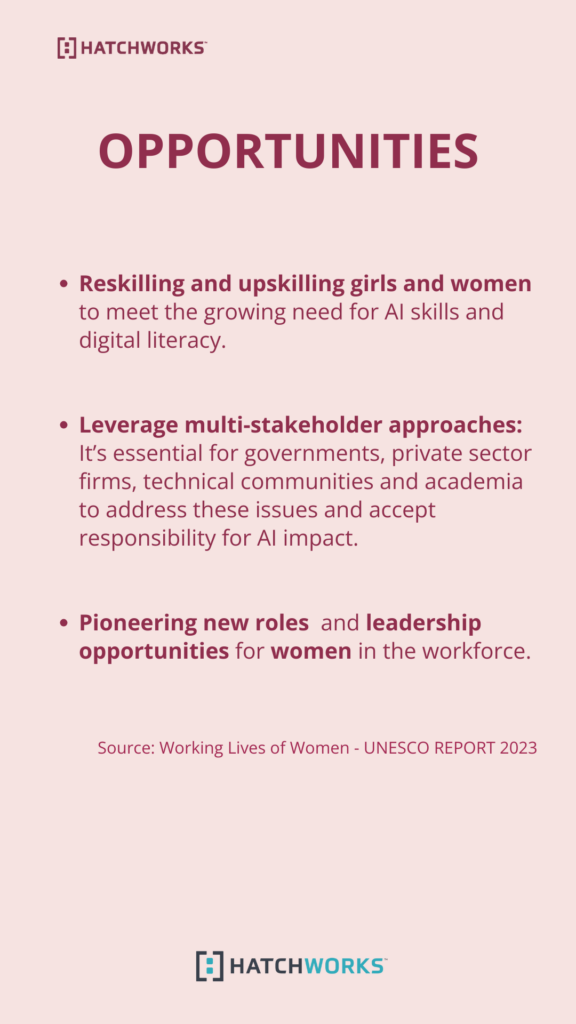 HatchWorks’ Commitment to Celebrating Women in Tech
HatchWorks’ Commitment to Celebrating Women in Tech
Women’s History Month serves as a reminder of the critical role gender equality plays in tech and the importance of continuous support for women’s achievements in AI/ML.
Let’s use this time to inspire action and ensure that the contributions of women in technology are recognized and celebrated, paving the way for future generations.
Make Data Your Biggest Differentiator
We build scalable, modern data systems tailored for AI.
Using Databricks’ industry-leading platform, we ensure your data is ready, secure, and optimized for AI.



